[ad_1]
Small projectors are usually a sequence of compromises: picture and sound quality often yield to the needs of portability. But in the case of the EpiqVision Mini EF12 Streaming Laser Projector, Epson seems to have found a good balance between these competing needs, crafting a projector that will work (and look) great anywhere in your home or in your backyard for movie night.
A good midrange projector
The EpiqVision Mini from Epson is a good choice for a mid-range projector, with a bright, sharp picture and decent sound. However, it could do with a little more flexibility, and it tends to wash out a bit even in moderately bright rooms.
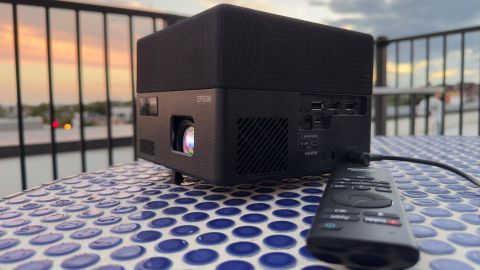
Upon unboxing, the EpiqVision Mini recalls old-time audiophile components (more on that later) with a squat, cube-like design. Its black and copper color scheme is a handsome, classic look that will fit in well in most people’s living rooms. Measuring 6.9 x 6.9 x 5 inches and weighing 4.7 pounds, the projector is small enough to be toted around the house and set up wherever you like.
Two HDMI ports (one with ARC), a USB-A port for attaching external storage, and stereo audio out port are on the left side. I would have preferred them to be on the back, as cables sprouting from the side of the projector look a little odd, but it’s a minor quibble. It sports a nice touch many projectors seem to have abandoned: a retractable foot for adjusting the projector’s angle on the bottom. Of all the projectors tested in the past two months, this was the only one with this (fundamental) component.
The remote is a fairly basic plastic thing, of insubstantial weight, with a basic set of controls, including one-touch access to YouTube, Google Assistant, and various projector settings like keystone adjustment. Its light weight meant I was constantly losing it in the blankets and pillows of my couch.
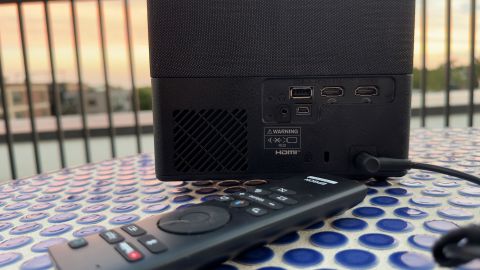
Set up is relatively easy, especially since it runs Android TV 11. If you’ve got an Android phone, the setup wizard will walk you through getting the projector on your Wi-Fi network and signing into all your Google accounts like YouTube. If you don’t have an Android phone, you can still set up the device by inputting all your credentials and passwords manually using the remote. It’s a little bit of a chore, but assuming you’re not doing it often, it is not onerous. Once set up, the device will boot up, probably apply some Android TV updates, and you’re ready to go.
There are also the usual auto-focus and auto-keystone correction functions that most modern projectors have. They work fine, although I missed the obstacle avoidance feature (found on more expensive models) that would scale the screen to ensure stray plants or picture frames didn’t intrude on the image.
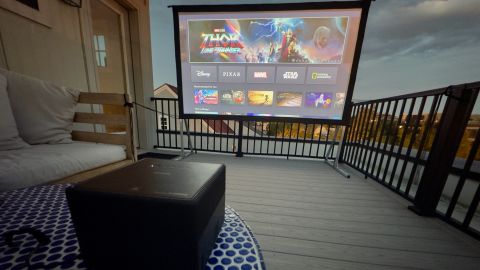
The EpiqVision Mini has a good picture at 1920 x 1080 resolution. The colors are bright and sharp, and, in a suitably dark room, the blacks are deep. The projection system is a 3LCD laser setup, which means it can output up to 1000 lumens with a contrast ratio of 200,000:1. The projector supports HDR10 and HLG color spaces and can project an image up to 150 inches diagonally measured.
The light source is a laser diode, which means there’s no lamp to replace. Epson says its laser projectors can run up to 20,000 hours with “virtually no maintenance.” I couldn’t test that claim, but the projector instantly started and generated a bright image. Despite the alleged benefits of laser projectors, however, I found that a moderate bit of ambient light washed out the picture. You’ll want a dark room or evening sky to get the best picture.
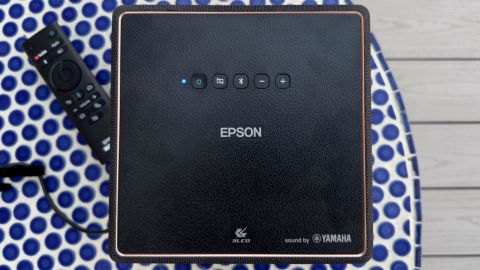
Based on how it highlights them in their marketing material, Epson is very proud that it has Yamaha speakers in the EpiqVision Mini. And, to be honest, they sound pretty good. The bass was suitably deep, and the highs didn’t sound tinny or strained. I was able to crank up the volume with little distortion.
That said, it’s still a small device with limited stereo separation. It can’t compete with a dedicated soundbar or higher-end audio setup, and you probably shouldn’t try. Speaking of soundbars, if you connect one, you’ll want to avoid connecting it via Bluetooth, which caused about a 2-second lag. I could never get the sound to match the picture when connecting this way. My Apple TV and a stereo pair of HomePods, however, were a great pairing with the Epson projector.
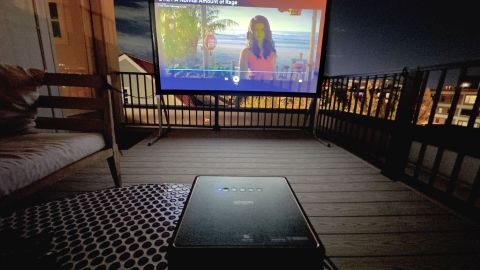
Like many other projectors, thanks to licensing limitations, the EpicVision Mini doesn’t natively support Netflix, which is flabbergasting in 2022. You can’t even install it from the Google Play Store. The only way to watch Netflix is to stream it from your phone, tablet, or laptop over Wi-Fi — non-ideal, to say the least — or get a supported device like an Apple TV, Roku, Chromecast, or Fire TV stick. As with the XGIMI Horizon Pro, this might be a dealbreaker for heavy Netflix watchers — though you can now get a Roku streaming stick for as little as $29.
In addition to the lack of Netflix, I felt the autofocus and the auto-keystone adjustment could use some work. When the projector starts, it projects a matrix of fuzzy green dots on the wall or screen. This is how it autofocuses and makes sure the image is true but adjusting it can be tedious. You have to select each corner of the image and manually match it to your screen or projecting area. If you move this projector around — and it is marketed for its portability — you’re going to be doing this a lot.
I also found the ability to zoom the projector image to be lacking. I didn’t set up in a cavernous room, and the image tended to be either too large or too small for the wall space. I could shrink it to 80 percent of the size, but even that was too big. Putting it on a coffee table left the picture a little dinky, even zoomed out to the maximum. A little more flexibility in that setting would be welcome.
| Dimensions |
6.9 x 6.9 x 5 inches |
7.6 x 7.6 x 2.3 inches |
|---|---|---|
| Weight |
4.7 pounds |
3.08 pounds |
| Native resolution |
1920 x 1080 |
1920 x 1080 |
| Brightness |
1000 lumens |
400 lumens |
| Image |
Up to 150 inches |
Up to 120 inches |
| Audio |
5W stereo |
3W stereo |
| Inputs |
HDMI (2), USB (2), 3.5mm jack |
HDMI 2.0, USB-A for flash drives, USB-C for charging |
| Connections |
Bluetooth |
Bluetooth, Wi-Fi |
| Streaming |
Chromecast |
Chromecast |
| Power |
N/A |
3 hours on battery, USB-C power |
| Software |
Android TV 11 |
Android TV 9 |
| Price |
$899.99 |
$559.99 |
The EpiqVision Mini from Epson is a good choice for a mid-range projector. A few things suffer from the more affordable price point, like its flexibility in how far or near it could be set up from the screen or wall, and a tendency to project a washed out picture, even in moderately bright rooms. Not being able to access Netflix natively is a big stumbling block.
If you want something similarly portable for a lower price — and with Netflix support — the Anker Nebula Solar Portable is a better overall value. But for those who are willing to pay more for a brighter, larger image, the EpiqVision Mini is a dependable pick that can easily be toted inside and outside your home.
[ad_2]
